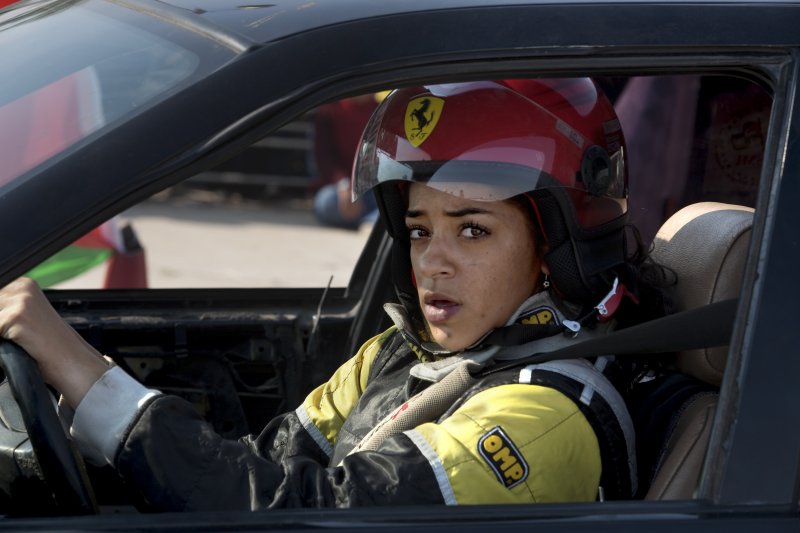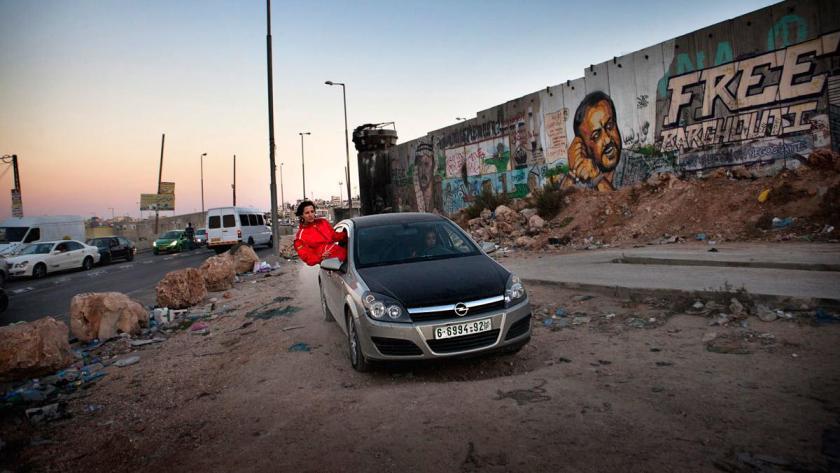It’s a fair bet that when Lewis Hamilton and his Formula One colleagues are driving to practice sessions they don’t have to queue for 90 minutes at a military checkpoint. This was just one illuminating vignette of the daily grind shown in Amber Fares’ interesting documentary about a group of Palestinian female car-racers, the first all-women team in the Arab world.
This incident happened to team captain Maysoon, who marshals Marah, Noor, Mona and Betty, four very likeable women who love racing cars. Fares tells their stories through interviews with the women and their families, interspersed with footage of the races they compete in. The women – from different backgrounds and with distinct personalities but in possession of the same competitive instinct – are not only competing with men from other teams but with each other to take the title of champion racer.
Fares proves that life carries on even amid the chaos of war
Marah, who is from a refugee family, is the reigning champion and the most instinctive driver; Noor, who by contrast comes from a wealthy background, struggles to remember course layouts; Mona is a dare-devil if accident-prone driver; and Betty is a blonde half-Latina who is fully aware that she brings in the male spectators. "I'm beautiful and attractive," she says matter-of-factly. "It's like we put the pepper on the food. A race without the girls is no fun."
The races aren’t start-to-finish competitions but individual time trials (filmed by Fares over two seasons), for the eventual title of champion racer in the Palestinian Motor Sports and Motorcycle Federation, which was founded in 2005.
The tracks are small and tight but rather basic obstacle courses (there are lots of handbrake turns, so perhaps Matt LeBlanc would feel at home here, rather than burning rubber at the Cenotaph) where mishaps such as hitting cones and driving in the wrong direction accumulate penalty points. The races take place in West Bank towns including Ramallah and Jericho, in makeshift venues including an open-area vegetable market, a parking lot and a helicopter pad.
 Moving around between the venues, as Maysoon explains when as she waits to go through yet another Israeli checkpoint, could add hours to a 15-minute journey. Although the ongoing strife is never far away – “The smell of tear gas reminds me of my childhood," Maysoon says, referring to the Intifada – and we see burning tyres (not attached to cars this time) and the “peace wall” between Arab and Israeli communities, Fares melds the political and personal with great skill.
Moving around between the venues, as Maysoon explains when as she waits to go through yet another Israeli checkpoint, could add hours to a 15-minute journey. Although the ongoing strife is never far away – “The smell of tear gas reminds me of my childhood," Maysoon says, referring to the Intifada – and we see burning tyres (not attached to cars this time) and the “peace wall” between Arab and Israeli communities, Fares melds the political and personal with great skill.
We meet various family members, with fathers noticeably proud and supportive of their daughters’ groundbreaking achievements – even if Marah’s more traditional grandfather says he would have preferred her to be a lawyer or doctor. Fares also contrasts Mona and Maysoon’s views on marriage, and how it might affect their involvement in the sport.
The film interview-race-interview-race format is slightly repetitive and there's little in the way of tension even as the championship nears its conclusion, but Fares proves that life carries on even amid the chaos of war.















Add comment